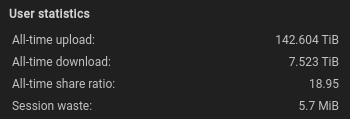







You’re not wrong, but it bugs me when my ratio drops, so I always seed everything I download. I have a pretty good internet service though.
My stats:

Maybe it’s still using the borked config because all sessions were not exited? Try exiting it and then make sure no tmux process is still running, by for example running ps -aux | grep tmux.
Otherwise there must be some tmux config still lying around in your $HOME.
Edit: I don’t know anything about Macs so I’m just assuming it works similar to linux.
Does fzf search hidden folders? You could also try with this, to make extra sure: find $HOME -name "*tmux*".


That’s OK, we all got our own preferences 😉 But I think you will be pretty good to go on t495. It has apparently been linux certified on older Ubuntu, which Mint is based on.
https://ubuntu.com/certified/201905-27049
Also linux certified by Lenovo:
https://support.lenovo.com/se/sv/solutions/pd500343-linux-certification-thinkpad-t495-20njz4krus


For arch you can look here:
deleted by creator


Drop oh-my-zsh and look for something else to customize your prompt. I like Powerlevel10k but Starship is good too.


It’s when you open a publicly facing port and map (forward) it to a local port your machine. In this case, it’s opened at the vpn provider’s public gateway. Otherwise, it would typically be opened in your router instead.
You can then configure your torrent client to listen on that local port that the public port is forwarded to. I think generally the public and the local port are the same number when using VPN.
If you do that, then others have the ability to initiate a connection to you instead of only you being able to initiate the connection to somebody else.
When seeding/leeching to/from someone else, at least one of you needs a port open. So, if you always have one open, you allow yourself to connect to anyone on the network regardless if they have one open or not.
Sorry if I confused you more, I’m not that great at explaining.


I seed without cap, don’t really need my upload for anything else. (500 Mbps)
What’s the distro? I can help seed it indefinitely with open ports.


Huh? Yes it does. Unless you mean it’s not cracked yet.


It seems to me that you misunderstand what artificial intelligence means. AI doesn’t necessitate thought or sentience. If a computer can perform a complex task that is indistinguishable from the work of a human, it will be considered intelligent.
You may consider the classic turing test, which doesn’t question why a computer program answers the way it does, only that it is indiscernable from a human response.
You may also consider this quote from John McCarthy on the topic:
Q. What is artificial intelligence?
A. It is the science and engineering of making intelligent machines, especially intelligent computer programs. It is related to the similar task of using computers to understand human intelligence, but AI does not have to confine itself to methods that are biologically observable.
There’s more on this topic by IBM here.
You may also consider a few extra definitions:
Artificial Intelligence (AI), a term coined by emeritus Stanford Professor John McCarthy in 1955, was defined by him as “the science and engineering of making intelligent machines”. Much research has humans program machines to behave in a clever way, like playing chess, but, today, we emphasize machines that can learn, at least somewhat like human beings do.
Artificial intelligence (AI) is the field devoted to building artificial animals (or at least artificial creatures that – in suitable contexts – appear to be animals) and, for many, artificial persons (or at least artificial creatures that – in suitable contexts – appear to be persons).
artificial intelligence (AI), the ability of a digital computer or computer-controlled robot to perform tasks commonly associated with intelligent beings